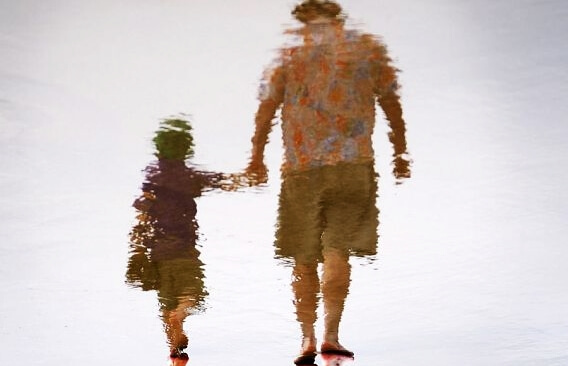Fathers Who Abandon Their Children Leave Lasting Scars

Many children are growing up in the world without the presence of their fathers. In fact, instances of fathers who abandon their children are extremely high, especially in Latin American countries. For some, this is due to social problems such as unemployment and poverty. For others, the most important factor is culture. As a matter of fact, in some settings father abandonment is seen as something relatively normal.
There seems to be a strong relationship between unplanned pregnancies, especially in adolescents, and fathers abandoning their children. This, added to macho patterns of behavior, mean that many men don’t view abandoning a child as negative.
” Abandoned field, guaranteed fire.”
-Anonymous saying-
While it’s true that human beings can grow and develop without having committed fathers by their side, it’s also true that those with fathers beside them have many and better opportunities in life. There are also cases in which paternal absence becomes a burden on the child and has really detrimental effects on them.
Why do we need a father and a mother?
Psychoanalysis postulates that maternal love is total and encompassing. The mother has a global influence on the life of her baby. She’s everything to her child. She affects the big and the small, the trivial and the important. She’s the complete environment, the universe in which the child grows up. Dependence on the mother is absolute at the beginning of life.

The strong bond between a mother and her child tends to last. In fact, the child knows that they depend on her for everything and they bow to her knowledge. Furthermore, her love is unconditional and this gives the little one security.
Some are fortunate to also have a father. This gives them a world that goes beyond their mother. In fact, a father is a different universe over which the mother doesn’t have full control. It’s the other side of reality. A third party that modulates the relationship of absolute dependence between mother and child.
The different forms of abandonment
Just as there are many ways to be with a child, there are also different ways to leave them. The absent father, in principle, is one who leaves the mother physically and psychologically alone to raise her child. He ignores the economic situation, the housework, and doesn’t care what happens to the child.
There are also those who leave emotionally, but not physically. They feel that their children are the mother’s concern. These fathers are physically there, but they don’t believe they have any responsibility for raising their children. They don’t talk to them, they don’t spend time with them, and they have no idea how their life is going. They simply limit themselves to paying the bills and giving the occasional order, from time to time and at their convenience. In fact, they don’t interact with the little ones at all.

There are also those who don’t leave emotionally, but physically. They might’ve formed another family or they’ve moved away. However, they still try to be aware of what’s happening to their children. They can never spend as much time as they would like, but they keep their children in their minds and in their hearts.
The different consequences of abandonment
Each type of abandonment generates its own consequences. In the case of the completely absent father, the consequences range from serious to extremely serious. If the father figure is replaced by someone, the effect will be less. However, if only a void remains, the echoes of that absence will likely be nothing short of devastating for the child.
By not having a third party in the mother-child equation, it’ll be extremely difficult for the child to individualize. They’ll probably have a hard time exploring and broadening their horizons, and trusting their abilities. Furthermore, they’ll constantly feel excluded and emotionally deprived. It doesn’t matter that the mother is, effectively ‘father and mother at the same time’. Because her presence will never replace that of the absent father who’ll always be needed by the child.

Children abandoned by their fathers have a much harder time adjusting to the world and reality. They’re also likely to develop a fear of deep bonding. Furthermore, boys might well grow up to abandon their children as well. On the other hand, in the case of girls, they’ll either mistrust men or trust them too much, thus repeating the very experiences of abandonment they want to overcome.
When abandonment is partial, the consequences are less obvious. The same features appear, but they’re nuanced and to some extent diluted. Nevertheless, whatever the situation, the absence of the father opens a deep emotional wound, especially in the first years of life. Furthermore, their loss will never be overcome and their disappearance will never be erased from the child’s life.
What does the research say?
According to research carried out by Arvelo (2002), father abandonment is associated with a greater number of emotional, cognitive, and language problems in male children. Apparently, these problems are related to identification processes, in which the absence of a male role model in the home affects males more for gender reasons.
The author also points out that ” poor school performance, transgressive behaviors, depression, school problems, frequent lies, rebellion and communication difficulties” are observed in the children of absent fathers.
According to Laura Evelia Torres et al (2011) from the National Autonomous University of Mexico, the role of the father is important because his figure imposes challenges. Indeed, Torres and her team claim that male parents establish more challenges for their children. This means the children tend to try harder and thus open up the possibility of traveling along new paths and adopting new perspectives.
The results of their research affirm that while mothers support their children, fathers are the ones who seek that they develop their potential, present them with challenges, and promote a feeling of achievement. This is subsequently transferred to other activities.
Many children are growing up in the world without the presence of their fathers. In fact, instances of fathers who abandon their children are extremely high, especially in Latin American countries. For some, this is due to social problems such as unemployment and poverty. For others, the most important factor is culture. As a matter of fact, in some settings father abandonment is seen as something relatively normal.
There seems to be a strong relationship between unplanned pregnancies, especially in adolescents, and fathers abandoning their children. This, added to macho patterns of behavior, mean that many men don’t view abandoning a child as negative.
” Abandoned field, guaranteed fire.”
-Anonymous saying-
While it’s true that human beings can grow and develop without having committed fathers by their side, it’s also true that those with fathers beside them have many and better opportunities in life. There are also cases in which paternal absence becomes a burden on the child and has really detrimental effects on them.
Why do we need a father and a mother?
Psychoanalysis postulates that maternal love is total and encompassing. The mother has a global influence on the life of her baby. She’s everything to her child. She affects the big and the small, the trivial and the important. She’s the complete environment, the universe in which the child grows up. Dependence on the mother is absolute at the beginning of life.

The strong bond between a mother and her child tends to last. In fact, the child knows that they depend on her for everything and they bow to her knowledge. Furthermore, her love is unconditional and this gives the little one security.
Some are fortunate to also have a father. This gives them a world that goes beyond their mother. In fact, a father is a different universe over which the mother doesn’t have full control. It’s the other side of reality. A third party that modulates the relationship of absolute dependence between mother and child.
The different forms of abandonment
Just as there are many ways to be with a child, there are also different ways to leave them. The absent father, in principle, is one who leaves the mother physically and psychologically alone to raise her child. He ignores the economic situation, the housework, and doesn’t care what happens to the child.
There are also those who leave emotionally, but not physically. They feel that their children are the mother’s concern. These fathers are physically there, but they don’t believe they have any responsibility for raising their children. They don’t talk to them, they don’t spend time with them, and they have no idea how their life is going. They simply limit themselves to paying the bills and giving the occasional order, from time to time and at their convenience. In fact, they don’t interact with the little ones at all.

There are also those who don’t leave emotionally, but physically. They might’ve formed another family or they’ve moved away. However, they still try to be aware of what’s happening to their children. They can never spend as much time as they would like, but they keep their children in their minds and in their hearts.
The different consequences of abandonment
Each type of abandonment generates its own consequences. In the case of the completely absent father, the consequences range from serious to extremely serious. If the father figure is replaced by someone, the effect will be less. However, if only a void remains, the echoes of that absence will likely be nothing short of devastating for the child.
By not having a third party in the mother-child equation, it’ll be extremely difficult for the child to individualize. They’ll probably have a hard time exploring and broadening their horizons, and trusting their abilities. Furthermore, they’ll constantly feel excluded and emotionally deprived. It doesn’t matter that the mother is, effectively ‘father and mother at the same time’. Because her presence will never replace that of the absent father who’ll always be needed by the child.

Children abandoned by their fathers have a much harder time adjusting to the world and reality. They’re also likely to develop a fear of deep bonding. Furthermore, boys might well grow up to abandon their children as well. On the other hand, in the case of girls, they’ll either mistrust men or trust them too much, thus repeating the very experiences of abandonment they want to overcome.
When abandonment is partial, the consequences are less obvious. The same features appear, but they’re nuanced and to some extent diluted. Nevertheless, whatever the situation, the absence of the father opens a deep emotional wound, especially in the first years of life. Furthermore, their loss will never be overcome and their disappearance will never be erased from the child’s life.
What does the research say?
According to research carried out by Arvelo (2002), father abandonment is associated with a greater number of emotional, cognitive, and language problems in male children. Apparently, these problems are related to identification processes, in which the absence of a male role model in the home affects males more for gender reasons.
The author also points out that ” poor school performance, transgressive behaviors, depression, school problems, frequent lies, rebellion and communication difficulties” are observed in the children of absent fathers.
According to Laura Evelia Torres et al (2011) from the National Autonomous University of Mexico, the role of the father is important because his figure imposes challenges. Indeed, Torres and her team claim that male parents establish more challenges for their children. This means the children tend to try harder and thus open up the possibility of traveling along new paths and adopting new perspectives.
The results of their research affirm that while mothers support their children, fathers are the ones who seek that they develop their potential, present them with challenges, and promote a feeling of achievement. This is subsequently transferred to other activities.
This text is provided for informational purposes only and does not replace consultation with a professional. If in doubt, consult your specialist.







